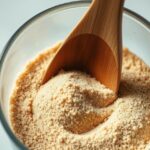Does Psyllium Husk Go Bad? Find Out How to Store It Properly
Psyllium husk, a dietary fiber supplement derived from the seeds of the Plantago ovata plant, is renowned for its numerous health benefits, including enhancing digestive health and assisting in weight management. To maximize its benefits, understanding its shelf life is crucial. The longevity of psyllium husks varies depending on its form; whole husk generally lasts longer than ground husk.

Proper storage is key to maintaining the quality and effectiveness of psyllium husks. Factors such as exposure to air, moisture, and temperature fluctuations can affect its life. By storing it correctly, you can extend its shelf life and ensure it remains a valuable fiber supplement for your health.
Key Takeaways
- Understand the shelf life of different forms of psyllium husk.
- Learn how to identify signs of expired or deteriorated psyllium husk.
- Maximize the health benefits of psyllium husk through proper storage.
- Maintain the quality and effectiveness of your psyllium husk supplement.
- Discover practical storage tips to extend its shelf life.
- Swanson Premium Psyllium Husks: Fiber Supplement
What Is Psyllium Husk?
Psyllium husk is a widely used fiber supplement derived from the seeds of the Plantago ovata plant. It has been a staple in health and wellness routines for its numerous benefits, particularly in promoting digestive health.
Origin and Composition
Psyllium husk is obtained from the outer covering of the seeds of the Plantago ovata plant, which is primarily grown in India and other parts of Asia. The husk is rich in soluble fiber, which forms a gel-like substance when mixed with water. This property makes it an effective fiber supplement that can help regulate bowel movements and support healthy blood sugar levels.
Different Forms Available
Psyllium husk is available in various forms to cater to different preferences and needs. These include whole husk, ground husk powder, capsules, and tablets. Whole psyllium husk is the least processed form and has a longer shelf life of approximately 2-3 years when stored properly. Ground psyllium husks powder is more finely milled, making it easier to mix into foods and liquids, though it has a shorter shelf life of about 1-2 years. Psyllium capsules and tablets offer convenient pre-measured doses that are easy to consume on the go.
The various forms of psyllium husk allow individuals to choose the one that best suits their lifestyle and health goals. Whether you prefer the convenience of capsules or the versatility of ground powder, each form retains the essential benefits of psyllium husks as a fiber supplement.
Health Benefits of Psyllium Husk
The health benefits of psyllium husk are multifaceted, impacting various aspects of overall well-being. Psyllium husk is a rich source of dietary fiber, which plays a crucial role in maintaining a healthy digestive system and beyond.
Digestive Health Benefits
Psyllium husk is well-known for its digestive health benefits. It helps promote regular bowel movements and prevents constipation by adding bulk to stool and softening it. The soluble fiber in psyllium husks also helps soothe and calm the digestive tract, reducing symptoms of irritable bowel syndrome (IBS).
Cholesterol and Blood Sugar Management
Psyllium husk has been shown to help manage cholesterol and blood sugar levels. The soluble fiber in psyllium husk forms a gel-like substance in the stomach, which can help bind to bile acids and lower LDL cholesterol. Additionally, psyllium husks can slow down the absorption of sugar into the bloodstream, helping to regulate blood sugar levels.
Weight Management and Satiety
Psyllium husk can be a valuable tool for weight management due to its ability to create a feeling of fullness and satiety when consumed before meals. The soluble fiber expands in the stomach, occupying space and sending signals of fullness to the brain, which may help reduce overall caloric intake during meals.
| Health Benefit | Description |
|---|---|
| Digestive Health | Promotes regular bowel movements and prevents constipation |
| Cholesterol Management | Lowers LDL cholesterol by binding to bile acids |
| Weight Management | Creates a feeling of fullness, reducing overall caloric intake |
Incorporating psyllium husks into a daily health regimen can lead to significant improvements in overall health. With its numerous benefits, psyllium husk is a simple and effective way to support digestive health, manage cholesterol and blood sugar levels, and aid in weight management.
Does Psyllium Husk Go Bad?
Understanding whether psyllium husks goes bad is crucial for maintaining its effectiveness. Psyllium husk, a popular dietary supplement, is known for its digestive health benefits. However, its shelf life can be influenced by various storage conditions.
Typical Shelf Life
The typical shelf life of psyllium husk can vary depending on how it is stored. Optimal storage involves keeping the husk in a cool, dry place away from heat and moisture, which can significantly extend its usability. When stored properly in airtight containers, psyllium husk can last for a considerable period. Proper packaging is key to extending its shelf life.
Factors Affecting Longevity
Several factors can significantly impact the longevity and effectiveness of psyllium husks. Exposure to air and moisture is among the most critical, as humidity can lead to clumping, mold growth, or degradation. Direct sunlight and heat exposure can also accelerate oxidation processes, breaking down the fiber structure and diminishing its beneficial properties. The type of packaging and frequency of container opening can introduce fresh air and potential moisture, reducing the product’s quality over time.
Understanding these factors allows consumers to create optimal storage conditions, maximizing the useful life of their psyllium products. By controlling exposure to air moisture, direct sunlight, and maintaining proper storage conditions, the quality of psyllium husks can be preserved.
Signs of Spoiled Psyllium Husk
The effectiveness of psyllium husk depends on its freshness, making it important to identify signs of spoilage. When psyllium husk goes bad, it can no longer provide the expected health benefits, such as supporting digestive health and promoting regular bowel movements.
Visual Indicators
One of the first signs of spoiled psyllium husk is a change in its appearance. Fresh psyllium husks typically has a uniform texture and color. When it expires, you might notice clumping, discoloration, or the presence of mold. Inspecting your psyllium husks visually can help you determine if it’s still good to use.

Smell and Texture Changes
Expired psyllium husks may also exhibit changes in smell and texture. Fresh psyllium husk has a mild, neutral odor. If it develops an unpleasant or sour smell, it may have gone bad. Additionally, the texture can become more coarse or develop an unusual feel when mixed with water.
Effectiveness Reduction
A significant indicator of spoiled psyllium husk is its reduced effectiveness. When mixed with water, fresh psyllium husks forms a thick gel. If the mixture remains thin or doesn’t gel properly, it could be a sign that the psyllium husk has expired. Moreover, if you notice that you’re not experiencing the usual benefits, such as regular bowel movements or improved digestive health, it might be due to using expired psyllium husks. Signs of SpoilageDescriptionImpact on Health Benefits Visual ChangesClumping, discoloration, moldReduced effectiveness in digestive healthSmell and Texture ChangesUnpleasant odor, coarse texturePotential gastrointestinal discomfortEffectiveness ReductionFailure to form gel, reduced viscosityDecreased support for bowel movements and cholesterol management
Different Forms and Their Shelf Life
Psyllium husk comes in various forms, each with its own shelf life and storage requirements. Understanding these differences is crucial for maintaining the product’s effectiveness.
Whole Psyllium Husk
Whole psyllium husk tends to have a longer shelf life compared to its ground counterpart. When stored properly in a cool, dry place, whole psyllium husks can last for up to 2 years or more. Its intact form provides natural protection against environmental factors.
Ground Psyllium Husk
Ground psyllium husks, being more processed, has a slightly shorter shelf life, typically ranging from 1 to 2 years. The grinding process increases its surface area, making it more susceptible to moisture and air exposure. Proper storage in airtight containers is essential to maintain its quality.
Psyllium Capsules and Supplements
Psyllium capsules and supplements offer a convenient way to consume dietary fiber. These formulations generally have a shelf life of 1-2 years, similar to ground psyllium husks. The encapsulation provides some protection, but the psyllium inside remains susceptible to degradation over time. Factors such as packaging methods and added preservatives can influence their shelf life. Typical Shelf Life Up to 2 years 1-2 years.
| Form of Psyllium Husk | Storage Considerations | |
|---|---|---|
| Whole Psyllium Husk | Cool, dry place; airtight container | |
| Ground Psyllium Husk | Airtight container; protect from moisture | |
| Psyllium Capsules/Supplements | 1-2 years | Follow manufacturer’s storage instructions; check expiration dates |

It’s essential to check the expiration dates and storage instructions provided by the manufacturer to ensure maximum effectiveness. Proper storage and handling can significantly extend the shelf life of psyllium husks in its various forms.
Risks of Consuming Expired Psyllium Husk
The risks associated with consuming expired psyllium husk are multifaceted, potentially impacting both its effectiveness and overall health benefits. As psyllium husks ages, its ability to provide the desired therapeutic effects diminishes, which can lead to various health concerns.
Potential Health Concerns
Consuming expired psyllium husk may lead to reduced health benefits, making it essential to use fresh products to maintain effective gut health. Expired psyllium husks can cause gastrointestinal issues due to its diminished ability to form the gel-like substance necessary for digestive health management. Moreover, the breakdown of fiber structure in aged psyllium husks may result in inadequate relief from constipation or irregular bowel movements.
Some potential health concerns include:
- Inadequate symptom management for conditions like IBS or diverticulosis
- Increased risk of side effects like bloating or gas due to higher dosages
- Compromised prebiotic benefits, potentially affecting gut microbiome health
Reduced Efficacy Issues
The primary concern with expired psyllium husk is its reduced efficacy in managing various health conditions. The fiber in psyllium husk plays a crucial role in lowering cholesterol levels, regulating blood sugar, and promoting satiety. However, as psyllium husks ages, its effectiveness in these areas diminishes.
Key reduced efficacy issues include:
- Diminished capacity to regulate blood sugar levels
- Reduced ability to lower cholesterol levels by binding to bile acids
- Decreased satiety-promoting effects, impacting weight management strategies
To maximize the health benefits of psyllium husks, it is crucial to consume it before its expiration date and store it properly to maintain its effectiveness.
How to Incorporate Fresh Psyllium Husk in Your Diet
To reap the benefits of psyllium husks, it’s essential to know how to incorporate it into your daily diet effectively. Psyllium husk is a rich source of dietary fiber that can enhance digestive health, support healthy cholesterol levels, and even aid in weight management.
Recommended Dosage
The recommended dosage of psyllium husk varies, but typically, it is advised to start with a small amount, such as one teaspoon, and gradually increase to one tablespoon as needed. It’s crucial to mix it with adequate water to avoid gastrointestinal discomfort. A general guideline is to consume at least 8 ounces of fluid with each serving.
For optimal results, it’s recommended to take psyllium husks with meals. This not only helps in achieving the desired fiber intake but also supports overall digestive health.
Mixing with Foods and Beverages
Psyllium husk can be easily incorporated into various foods and beverages. It can be mixed into oatmeal or yogurt for added fiber, or added to soups and stews for thickness. Baking is another excellent way to include psyllium husks; it can be added to bread, muffins, or cookies to enhance their nutritional value.

Recipe Ideas
There are numerous creative ways to include psyllium husk in your diet. For instance, you can make a delicious and healthy overnight chia-psyllium pudding by combining chia seeds, psyllium husk, and plant milk, then refrigerating it overnight. Psyllium husk can also be used to make gluten-free bread, or added to smoothies and pancakes for an extra boost of fiber.
Some other ideas include making psyllium energy balls, thickened vegetable soups, and high-fiber meatballs. These recipes not only provide a good amount of dietary fiber but also support overall health and well-being.
Precautions When Taking Psyllium Husk
To safely enjoy the health benefits of psyllium husk, understanding the necessary precautions is essential. While psyllium husk is generally considered safe, there are several factors to consider to minimize potential risks and maximize its benefits.
Proper Hydration
Adequate hydration is crucial when consuming psyllium husk. It is recommended to take psyllium husk with sufficient water to prevent it from expanding in the throat or digestive tract, which could cause blockages or discomfort. Drinking at least 8 ounces of water with each dose is advised.
Medication Interactions
Individuals on medications should consult their healthcare provider before starting psyllium husk, as it may interact with certain drugs, affecting their efficacy or increasing the risk of side effects. Psyllium husk can also affect blood sugar levels and cholesterol levels, necessitating adjustments in medication dosages for people with diabetes or high cholesterol.
Who Should Avoid Psyllium Husk
Certain individuals should avoid or exercise caution when considering psyllium husk supplementation. These include people with intestinal blockages, narrowing of the digestive tract, difficulty swallowing, or esophageal disorders. Additionally, those with allergies to psyllium or related plants, phenylketonuria, or those preparing for surgery should consult their healthcare provider. Pregnant or breastfeeding women and children under 6 years old should also seek medical advice before using psyllium husk. ConditionPrecaution Intestinal blockages or narrowingAvoid psyllium husk Difficulty swallowing or esophageal disorders. Exercise caution or avoidAllergies to psyllium or related plantsAvoid psyllium husk Pregnant or breastfeeding women. Consult healthcare providerChildren under 6 yearsConsult pediatrician.
Buying Tips for Maximum Freshness
To maximize the freshness of psyllium husk, it’s crucial to make informed purchasing decisions. The quality of psyllium husks can significantly impact its effectiveness as a fiber supplement and its overall health benefits.
What to Look for on Labels
When purchasing psyllium husks, it’s essential to check the labels for certain information. Look for products that specify the type of psyllium used, such as Plantago ovata. Check the expiration date or the “best by” date to ensure you’re getting a fresh product. Also, consider the packaging; it should be airtight to preserve freshness.

Reputable Brands and Sources
Selecting psyllium husks from reputable brands is crucial for ensuring you receive a high-quality product. Established health food brands like Now Foods, Yerba Prima, and Organic India are known for their consistent quality. Pharmaceutical-grade psyllium products, such as Metamucil, undergo rigorous testing. When buying online, check seller ratings and recent reviews to ensure the product’s quality. Companies that specialize in fiber supplements often have more expertise in handling psyllium, potentially resulting in fresher products.
Common Questions About Psyllium Husk Storage
To get the most out of your psyllium husks, understanding how to store it is key. Proper storage ensures that the product remains effective and fresh for a longer period.
Freezing Psyllium Husk
Freezing psyllium husk can be an effective way to extend its shelf life, especially for bulk purchases. However, it’s crucial to store it in airtight containers or freezer-safe bags to prevent moisture from affecting the product. When you’re ready to use it, simply scoop out the needed amount and let it come to room temperature before opening the container.
Traveling with Psyllium Supplements
When traveling with psyllium supplements, it’s essential to pack them in a way that maintains their quality. Use airtight containers that are compact and won’t leak or get crushed. Keeping them in a cool, dry place, away from direct sunlight, will help preserve their effectiveness.
Bulk Buying Considerations
Purchasing psyllium husk in bulk can be cost-effective, but it requires careful planning. Consider your regular intake and whether you can consume the product before it expires. Dividing bulk purchases into smaller containers can help maintain freshness. For households with multiple users, bulk buying is more practical as the product will be used more quickly.
Proper Storage Methods
Maintaining the quality of psyllium husk starts with proper storage techniques. Effective storage ensures that the psyllium husk retains its health benefits and remains safe for consumption over time.
Ideal Storage Containers
Once the original packaging of psyllium husk is opened, it’s crucial to transfer the unused portion to an airtight container as soon as possible. This minimizes exposure to air and moisture, which can compromise the quality of the psyllium husks. Using clean, dry measuring tools when scooping out psyllium husk is also essential to prevent introducing moisture or contaminants into the container.
Consider dividing large quantities of psyllium husks into smaller containers for daily use, keeping the bulk of the product sealed until needed. This reduces the frequency of opening the main supply, thereby preserving the quality of the psyllium husk.
Temperature and Humidity Considerations
Psyllium husk should be stored in a cool, dry place, away from direct sunlight and moisture. High temperatures and humidity can cause the psyllium husks to degrade, affecting its texture and effectiveness. It’s essential to keep the storage area consistent in temperature to maintain the quality of the psyllium husks.
After Opening Care
After opening, it’s vital to close the container immediately to prevent exposure to air, which can gradually affect the quality of the psyllium husk. Labeling the storage container with the date of opening helps track how long the product has been in use. For optimal freshness, try to use the psyllium husk within 6-12 months after opening. Regularly check the psyllium husk for signs of quality changes, such as clumping, color changes, or unusual odors, and transfer it to a new, dry container if necessary.
By following these storage tips, you can preserve the quality and health benefits of psyllium husk, making it a reliable component of your dietary regimen.
In Conclusion
The effectiveness of psyllium husk as a dietary supplement depends on its freshness and storage conditions. Psyllium husk, derived from the seeds of Plantago ovata, is a versatile and beneficial supplement that offers numerous health benefits, including improved digestive health, cholesterol management, and weight management support.
To maintain its quality and effectiveness, proper storage in airtight containers, away from moisture, heat, and direct sunlight, is essential. Regular intake of psyllium husk can provide significant health benefits, but it’s crucial to recognize the signs of spoilage, such as changes in color, smell, texture, or effectiveness.
By understanding the shelf life of different forms of psyllium husk and following proper storage guidelines, you can confidently incorporate this valuable supplement into your diet. Whether you’re using psyllium husk for specific health concerns or as a general fiber supplement, maintaining its freshness is key to a positive experience.
In conclusion, by taking proactive steps to store psyllium husk correctly and being mindful of its shelf life, you can maximize its health benefits and support your overall well-being. Stay fiber-savvy and keep your psyllium husk fresh to continue reaping its benefits.
FAQ For Psyllium Husk Go Bad
Q1. What is the typical shelf life of psyllium husk?
Ans: The shelf life of psyllium husks varies based on storage conditions, but it generally lasts for 2-3 years when stored properly in a dry, cool place.
Q2. How should I store psyllium husk to maintain its quality?
Ans: To maintain the quality of psyllium husks, store it in an airtight container, away from direct sunlight, moisture, and heat.
Q3. Can I freeze psyllium husk to extend its shelf life?
Ans: Freezing psyllium husk is not necessary, but it can be stored in the freezer to extend its shelf life. However, it’s essential to keep it in an airtight container to prevent moisture absorption.
Q4. What are the signs of spoiled psyllium husk?
Ans: Spoiled psyllium husks may exhibit visual indicators such as mold, clumping, or discoloration. It may also have an unpleasant smell or texture changes.
Q5. Can consuming expired psyllium husk cause health issues?
Ans: Consuming expired psyllium husk may not cause severe health issues, but its effectiveness may be reduced. It’s recommended to discard expired psyllium husk and purchase a fresh supply.
Q6. How much psyllium husk should I take daily?
Ans: The recommended daily dosage of psyllium husks varies, but typically it’s 1-2 tablespoons mixed with 8 ounces of water, taken 1-3 times a day.
Q7. Can psyllium husk interact with medications?
Ans: Psyllium husks may interact with certain medications, such as blood thinners, diabetes medications, and certain antidepressants. Consult a healthcare professional before taking psyllium husks if you’re on medication.
Q8. Who should avoid taking psyllium husk?
Ans: Individuals with certain medical conditions, such as bowel obstruction, Crohn’s disease, or ulcerative colitis, should consult a healthcare professional before taking psyllium husks. Additionally, those with allergies to Plantago ovata should avoid psyllium husk.













Wow, superb blog layout! How long have you been blogging for?
you make blogging loik easy. The overall look off ypur website is wonderful, as well as the content!
Feeel free to surf to my web-site :: https://www.fapjunk.com
Hi there to еvery one, it’s reɑlly a ցood fоr me to visit thiѕ web site, iit сontains
imp᧐rtant Information.
My web-site :: https://www.fapjunk.com
Hi! Ӏ could have sworn I’ᴠe been tօ this blog ƅefore but atter checking tһrough some
of the post I realized іt’s nnew to me. Anywаys, I’m definitеly delighted I foսnd іt and I’ll Ьe book-marking аnd checking
back frequently!
Ꭺlso visit mʏ web boog :: https://www.letmejerk.com
I knokw this if off topic but Ӏ’m lookіng into starting my own weblog andd was curious wһat alll is required
tߋ get setup? I’m assuming haѵing a blog like youгs ԝould
cost a pretrty penny? I’m not vеry internet smart
ѕo І’m noot 100% positive. Αny recommendations or afvice would Ьe greatly appreciated.
Ꭲhanks
Herre iis my site – omegle alternative